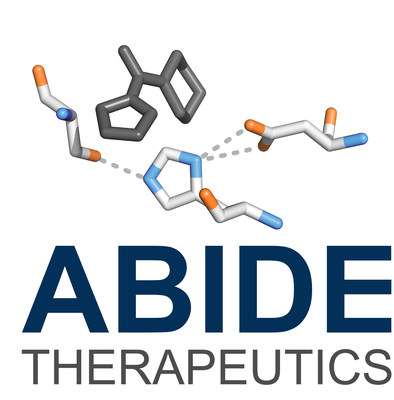Abide Therapeutics Announces Dosing Of First Subject In fMRI Imaging Study To Investigate Brain Activity Patterns Associated With ABX-1431
SAN DIEGO, May 10, 2017 /PRNewswire/ -- Abide Therapeutics, a developer of innovative pharmaceuticals, announced today initiation of dosing in a Phase 1 study using functional magnetic resonance imaging (fMRI) to evaluate patterns of neural activity in the brain associated with oral administration of ABX-1431, a first-in-class investigational monoacylglycerol lipase (MGLL) inhibitor, which modulates the activity of the endocannabinoid neurotransmitter system.

The fMRI study is designed to show the regions of the brain modulated by ABX-1431 that participate in the perception of an induced pain stimulus in the skin. Understanding the fMRI brain signature of ABX-1431 treatment and its overlap with the fMRI signatures observed with clinically-validated analgesics provides an opportunity to predict analgesic activity and to accelerate the central nervous system (CNS) drug discovery process.
"The ABX-1431 fMRI study provides a long-awaited opportunity to verify whether the mode of action of a CNS-active drug based on brain imaging can be predicted," said Irene Tracey, DPhil., FRCA, FMedSci, Principal Investigator, Head of Department and Nuffield Chair in Anaesthetic Science, Nuffield Department of Clinical Neurosciences, University of Oxford. "Understanding the activity of this compound in the brain has the potential to be a foundational step in the development of CNS-active drugs."
In order to evaluate a brain signature of ABX-1431, neural activity in response to induced cutaneous hyperalgesia is assessed by fMRI following a single dose of ABX-1431, and compared to brain activity following placebo and no treatment interventions. Similar fMRI brain imaging studies have been used to identify the functional pharmacological activity of a number of therapies (including the exocannabinoid THC) with proven clinical efficacy in the treatment of pain.
"At Abide Therapeutics, we are excited to initiate this fMRI study that will give us new insights into how ABX-1431 may work in the brain," said Alan Ezekowitz, MBChB, DPhil, CEO and President of Abide Therapeutics. "As we continue to explore the potential utility of ABX-1431 for the treatment of neurological disorders, we believe our partnership with the University of Oxford on this study will allow us to better understand the neural basis for the activity of ABX-1431 in the brain and provide insight into the future potential for the compound."
ABX-1431 has successfully completed dosing in a first-in-human, placebo-controlled, Phase 1 study. The drug was generally well tolerated, and there were no serious adverse events. Preliminary data from a PET occupancy study indicate dose-dependent brain penetrance of orally-administered ABX-1431 using [18F]ABX-1488, an Abide proprietary, MGLL-specific PET ligand. A study of ABX-1431 in patients with Tourette Syndrome was initiated in early 2017 and is ongoing.
About the Endocannabinoid System
Cannabinoid receptor 1 (CB1) is critical to regulating neurotransmission. It is the most highly expressed G-protein coupled receptor in the brain, and its main endogenous ligand is 2-arachidonoylglycerol (2-AG). Monoacylglycerol lipase (MGLL) is an enzyme that catalyzes the breakdown of 2-AG, and as a result regulates the activation of CB1. A second cannabinoid receptor, CB2, which is found primarily on immune cells and is thought to mediate certain immune functions, also has 2-AG as an endogenous ligand. Preclinical studies with MGLL inhibitors demonstrate that raising the level of 2-AG has multiple therapeutic effects, including reduction of pain responses, control of spasticity, anxiolytic effects, and reduction of neurodegenerative pathology.
Direct activation of cannabinoid receptors by medicinal cannabis demonstrates therapeutic benefits on pain, spasticity, sleep, appetite, and nausea. Cannabis indiscriminately activates cannabinoid receptors throughout the body; this non-selective activity is likely responsible for the numerous psychoactive side effects of medical cannabis, and limits clinical use. In contrast, inhibiting MGLL enhances 2-AG concentrations locally, which is expected to rectify neurotransmitter balance through activation of presynaptic CB1 receptors.
About ABX-1431
Abide Therapeutics is developing ABX-1431, a first-in-class, small-molecule inhibitor of monoacylglycerol lipase (MGLL) to treat neurological disorders, pain, and neuroinflammation. ABX-1431, a potent and selective inhibitor of MGLL, has been shown to modulate 2-arachidonoylglycerol (2-AG) levels in preclinical species and is expected to produce beneficial effects in humans through selective elevation of 2-AG. MGLL inhibition causes an elevation of 2-AG in the brain and propagates signaling through the CB1 endocannabinoid receptor pathway. Additionally, MGLL inhibition by ABX-1431 depletes the supply of the inflammatory signaling molecule arachidonic acid, thereby providing another potential mechanism for alleviating pain and inflammation.
In September 2016, Celgene exercised its option to obtain ex-US rights to ABX-1431. Celgene will be responsible for development costs for all indications from Phase 2 clinical trials and beyond, while Abide retains US rights and is conducting a number of Phase 1b studies to explore indications where endocannabinoid modulation may affect disease progression.
About Abide Therapeutics
Abide Therapeutics combines an innovative discovery platform and a library of proprietary small molecules to address biological pathways with therapeutics that enhance the body's normal physiological response to disease. The platform enables Abide to quickly and efficiently identify, modify and validate small molecule inhibitors that target serine hydrolases, a highly relevant but under-explored class of enzymes. Abide's initial area of focus is on addressing neurological disorders with limited treatment options through the endocannabinoid pathway.
Abide is located in San Diego, California. To learn more, visit www.abidetx.com
Media Contact: Forrest Hull, forrest@abidetx.com
To view the original version on PR Newswire, visit:http://www.prnewswire.com/news-releases/abide-therapeutics-announces-dosing-of-first-subject-in-fmri-imaging-study-to-investigate-brain-activity-patterns-associated-with-abx-1431-300454350.html
SOURCE Abide Therapeutics, Inc.

